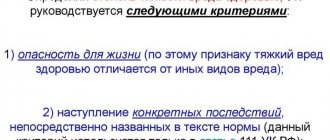As a lawyer with many years of practice, I often encounter crimes committed in connection with street conflicts. People often come to me with the question, what to do if you “told” an inappropriate neighbor? Or when returning home from work, he met a hooligan who was the first to get into a fight, but in the end he himself ended up in a hospital bed. The article for causing grievous bodily harm provides for different degrees of punishment. I will talk about penalties for such crimes below.
What is serious harm to health, according to the Criminal Code of the Russian Federation?
In accordance with Article 15 of the Criminal Code of the Russian Federation, grave crimes include acts committed intentionally and carelessly, the punishment for which does not exceed 10 and 15 years of imprisonment, respectively.
Serious crimes, due to their danger, are on the second line of the criminal hierarchy after especially serious ones and are punished accordingly quite severely. Such offenses include: skilled theft, robbery, robbery, causing grievous bodily harm (abbr. PTVZ) and others.
What can mitigate or increase guilt?
There are many factors that can be both mitigating and aggravating.
Softening:
- The culprit has not previously been brought to administrative or criminal liability.
- The culprit was a woman who is pregnant or is the mother of minor children.
- The driver did not try to escape from the scene and provided assistance to the victim in every possible way.
- Confession, cooperation with the investigation.
- The culprit does not refuse to compensate for the damage caused to health, as well as moral damage.
This is not a complete list of mitigating circumstances, but only the most common of them.
Aggravating:
- The culprit fled the scene.
- The culprit was under the influence of alcohol or drugs.
- The driver had previously been brought to administrative or criminal liability.
What is considered grievous bodily harm?
The concept of grievous bodily harm was previously enshrined in the Russian Criminal Code until 1995 (Article 108). Many people continue to call this composition that way in the old fashioned way.
The modern Criminal Code in Article 111 provides for liability for intentionally causing grievous bodily harm. Let's take a closer look at the grave consequences in criminal law.
The criteria for qualifying signs of causing grievous bodily harm (GHH) to a person are:
- Harm that is life-threatening, creating an immediate threat to life, which includes:
- head wounds with damage to the skull;
- various fractures of the skull bones;
- intracranial injuries;
- wounds and damage to internal organs (tears, cuts, ruptures, etc.);
- penetrating wounds of the chest and abdominal cavities (even without damage to internal organs);
- and about 10 more positions of damage.
- Dangerous harm to health, causing the development of a life-threatening condition:
- severe shocks;
- severe comas;
- massive, acute blood loss;
- respiratory, cardiac, renal failure of severe degrees;
- sepsis and peritonitis;
- other conditions.
- A person’s loss of vision, speech, hearing or any organ or the loss of an organ’s functions (loss of legs, arms, testicles, genitals).
- Abortion.
- Mental disorder.
- Drug addiction or substance abuse.
- Permanent facial disfigurement.
- Significant persistent loss of general ability to work by at least one third.
- Complete loss of professional ability to work (for example, the hand of an artist or the leg of a professional football player was cut off).
An exhaustive list of criteria is set out in the Appendix to the Order of the Ministry of Health and Social Development of the Russian Federation dated April 24, 2008 N 194, issued on the basis of Resolution No. 522 of 2007.
Moscow
Saint Petersburg
Free consultation
Moscow
Saint Petersburg
How to write a statement about beating to the police
In cases where damage to health was caused in the form of beatings, and there are no external signs left, the victims do not want to file a complaint with the police, since there are no visible injuries. If the victim does not see pronounced injuries on the body, he should still be examined by a physician, who will reflect in the report the condition of the victim, and possibly find evidence on the victim’s body confirming that a crime was committed against the victim.
Proving the fact of beatings is not easy, but video camera recordings, testimony of eyewitnesses, and those who provided first aid are accepted as evidence.
In the case where the victim has visible consequences of the unlawful actions of another person, it is worth contacting the police, where the victim will also be sent to medical workers who will examine the person, provide assistance and reflect the existing injuries in a medical report.
If the victim has written a statement to the police, it must be considered on its merits, but often the case is heard in the magistrate's court in private and the victim can represent himself or herself or with the help of his lawyer.
In the application to initiate a case, the victim must indicate personal information, full name, contact information, circumstances of the offense committed against the applicant, available information about the person who committed the crime. Police officers are required to submit a sample application.
To confirm information about the applicant’s harm to health, law enforcement agencies are required to send the victim for a medical examination, where medical workers will assess the victim’s condition and the nature of the illegal actions that caused the damage.
After establishing the health status, doctors issue a conclusion about the degree of harm caused to the person. Depending on what is in the medical examination report, police and prosecutors will determine what kind of responsibility the person who committed the crime will face, administrative or criminal.
If the victim was beaten, without visible injuries on the body, the victim needs to contact medical services as quickly as possible. If there are no bruises, abrasions or other evidence left, doctors will be able to timely record the general state of health, possibly pain, dizziness, psychological state and other signs that can be used as confirmation that an offense has actually been committed. Thus, the victim can go to a medical facility on his own, before contacting the police.
As a rule, statements of this nature are submitted immediately, in the coming days after the beating. The deadline for submitting all necessary documents is two years, but it is advisable to submit all documents as early as possible, since during investigative actions immediately after the commission of an offense, there is a greater opportunity to prove it.
If during the trial or even at the stage of filing documents, the victim and the offender come to a common agreement on the payment of compensation or any other assistance to the victim, or in the event of reconciliation and renunciation of claims, the victim can withdraw the application and the trial will be terminated.
The court, in this case, must conduct an investigative measure regarding the voluntariness of the victim’s intentions to withdraw the statement, determine for what reasons he decided to refuse, whether pressure was put on him in the form of blackmail or a threat to life.
Signs, composition and qualification of intentional infliction
Article 111 of the Criminal Code of the Russian Federation in its structure represents a complex composition or a composition with two forms of guilt for causing severe bodily harm (the presence of part 4 in the article with careless causing of death), in general the crime is considered intentional.
- The object of the crime is public relations related to the protection of the life and health of a citizen.
- The subject is a sane person who has reached the age of fourteen.
- The subjective side reflects the presence of intent in general and negligence for the qualified fourth part.
- The objective side is the act of a person with criminal intent aimed at causing bodily harm to another person, the consequences in the form of grievous harm and the existence of a causal connection between the act and the consequences.
The article consists of four parts. The first is the main composition and three parts with qualifying characteristics.
PTVZ with qualifying criteria can be committed:
- in connection with an official or public duty performed by a person;
- in relation to a minor, helpless person, with particular cruelty, mockery, torment of the victim;
- in a generally dangerous manner;
- for hire;
- for hooligan reasons;
- motives of political, religious and racial hostility;
- for the purposes of using human organs;
- use of weapons or objects;
- two or more victims;
- in a group organized by a group of persons or by prior conspiracy.
Part four, as a qualification, provides for the unintentional death of a person from the injuries caused. This is the most serious sign in this composition, although in its essence it is careless.
An exception
There are only two exceptions when the police have the right to initiate such cases. These are situations when:
- information about the person who committed the act is unknown (that is, you do not know who to apply for);
- the crime was committed against a person who, due to a dependent or helpless state or for other reasons, cannot defend his rights and legitimate interests.
Punishment for intentionally causing grievous bodily harm
The heavier and more dangerous the offenses are, the more severe and severe the punishment for their commission. But before pointing out responsibility, you need to know:
From what age does it begin?
Responsibility for all articles providing for PTVZ begins at the age of 14. As a rule, for committing a crime under Article 111 of the Criminal Code of the Russian Federation, courts sentence people to real and long terms of serving the sentence.
What articles provide for criminal liability?
Several elements of the Criminal Code of the Russian Federation are charged with causing grievous bodily harm - these are articles 111, 113, 114, 118.
Only one of the above is intentional – the provisions of Article 111. The rest are careless in terms of consequences.
A detailed description of Article 118 (causing grievous harm through negligence) can be read here.
What is the sentence for causing grievous bodily harm?
Below in the table we present the types of punishments and terms.
| How many years do you get for serious bodily injury? | PTVZ Art. 111 of the Criminal Code of the Russian Federation | Affect art. 113 | Exceeding the limits of defense and measures to detain a person Art. 114 | ||||
| Part 1 | Part 2 | Part 3 | Part 4 | Part 1 | Part 2 | ||
| Restriction of freedom | — | — | — | — | Up to 2 years | Up to 1 year | Up to 2 years |
| Forced labor | — | — | — | — | |||
| Correction work | — | — | — | — | |||
| Deprivation of liberty | Up to 8 years | Up to 10 years | Up to 12 years | Up to 15 years | |||
As can be seen from the table above, the most lenient penalties can be obtained when charged under Article 114, then 113, and the most severe measures are actual imprisonment from 8 to 15 years, depending on the part of Article 111 for intentionally causing grievous bodily harm.
Moscow
Saint Petersburg
Free consultation
Moscow
Saint Petersburg
If defense measures are exceeded
As sad as it may be, sometimes defending your dignity can be punished criminally. In most cases, minor injuries may not be considered by the court at all.
Important! If it happens that the attacker or offender received serious bodily injuries, then the punishment is limited to one year of forced labor, correctional labor or restriction of freedom for the same period.
Back in September 2012, the Plenum of the RF Armed Forces was held, where a resolution was adopted, on the basis of which some amendments were made regarding the legality of self-defense. Therefore, cases began to appear when people were deprived of liberty for two years.
This happened at the time of the arrest of the criminal. One of the law enforcement officers, left alone with the criminal, got involved in a fight with him and used a weapon. The criminal was seriously injured, and the employee was sentenced to two years probation. And no matter how unfair the decision may turn out to be, it is the decision of the court, which considered it fair.
How to prosecute a person responsible for grievous bodily harm?
In accordance with parts 1, 5 of Article 20 of the Criminal Procedure Code of the Russian Federation, the crimes we are considering are cases of public prosecution.
This means that in order to initiate a criminal case a statement from the victim is not required ; the case is initiated by the investigative body upon the commission of a criminal act.
Victims who suffer serious harm to their health most likely end up in a hospital bed. Law enforcement agencies will learn about this fact within the first hours of going to the hospital. The victim will be immediately interviewed in writing and a referral for examination for the appropriate doctor.
To bring the perpetrator to justice, you need to remember all the circumstances of what happened and tell the investigator about everything in detail.
7(800) 350-23-68
Dmitry Konstantinovich
Expert of the site "Legal Consultant"
Ask a Question
If possible, you should involve a lawyer in the case as a representative of your interests during the investigation and in court. He does not need to prove the person’s involvement in the commission of a crime; establishing his guilt is the job of internal affairs officers. A lawyer in the case is necessary, first of all, to collect additional documents necessary for further recovery from the perpetrator of compensation for the harm caused.
If your friends were present when you were injured, it is necessary to convince them to also give evidence necessary for the investigation. Undergo a full forensic medical examination, tell in detail about the existing injuries and painful conditions to the medical examiner. This is where the role of the victim in helping to bring the perpetrator to justice should end.
Investigators are mostly professionals in their field and they know very well how to bring a case to trial.
How moral and material damage is compensated
In accordance with current legislation, bringing to administrative or criminal liability is not a reason for evading compensation for moral or material damage.
According to Article 1064 of the Civil Code of the Russian Federation, harm caused to the person or property of a citizen, as well as harm caused to the property of a legal entity, is subject to compensation in full by the person who caused the harm.
The person who caused the harm is released from compensation for harm if he proves that the harm was not caused through his fault. The law may provide for compensation for harm even in the absence of the fault of the harm-doer.
Amount of insurance payment under compulsory motor liability insurance in connection with damage to life and health:
- in the amount of 500,000 rubles, if a fatal accident occurred, the victim received the first group of disability;
- 350,000 rubles if the victim received the second group of disability as a result of injuries received during the accident;
- 250,000 rubles when registering a disability of the third group.
The decisive factor here is the availability of valid insurance. It is clear that insurance does not always cover the amount of compensation. The maximum amount of insurance payments for the restoration of damaged vehicles is 400,000 rubles.
Moral injury
The amount of compensation for moral damage is determined by the interested party depending on the nature of the injuries received. Not only the injured persons, but also their close relatives have the right to receive compensation. If a criminal case is underway against the culprit, a civil lawsuit must be filed to obtain compensation for moral damages.
Material damage
The amount of financial compensation depends on the nature of the damage and has a specific amount prescribed by law.






